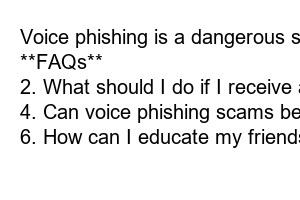보이스피싱 당했을때
Have you ever received a phone call from someone claiming to be from your bank or a government agency asking for personal information? You may have been a victim of voice phishing, a type of scam where fraudsters manipulate victims into giving away confidential information over the phone. **Voice phishing**, also known as vishing, can happen to anyone, regardless of age or background. In this blog post, we will discuss what voice phishing is, how to recognize it, and most importantly, how to protect yourself from falling victim to this type of scam.
**What is Voice Phishing?**
Voice phishing is a type of scam where fraudsters use phone calls to manipulate victims into giving away personal information such as bank account numbers, social security numbers, or passwords. These scammers often pose as representatives from trusted organizations like banks, government agencies, or tech support companies to gain the victim’s trust and access their sensitive information.
**How to Recognize Voice Phishing**
One of the most common signs of voice phishing is receiving a phone call from an unknown number and being asked to provide personal information over the phone. Scammers may also use scare tactics or urgency to pressure victims into giving away their sensitive information. It’s important to remember that legitimate companies will never ask for your personal information over the phone without prior verification.
**Protecting Yourself from Voice Phishing**
To protect yourself from voice phishing, always be cautious when receiving unsolicited phone calls asking for personal information. Never give out your sensitive information over the phone unless you have verified the caller’s identity. If you are unsure whether a call is legitimate, hang up and call the company directly using a verified phone number to confirm the request.
**Common Voice Phishing Scams to Watch Out For**
Some common voice phishing scams include callers posing as IRS agents threatening legal action unless immediate payment is made, or scammers claiming to be tech support representatives asking for remote access to your computer. Be vigilant and always question the legitimacy of unsolicited requests for personal information over the phone.
**Reporting Voice Phishing Scams**
If you believe you have been a victim of voice phishing, report the scam to the Federal Trade Commission (FTC) and your local law enforcement agency. By reporting these scams, you can help prevent others from falling victim to the same fraudulent tactics.
**Summary**
Voice phishing is a dangerous scam that can result in identity theft and financial loss. By being aware of the signs of voice phishing, you can protect yourself from falling victim to these fraudulent schemes. Remember to always verify the identity of callers asking for personal information over the phone and report any suspicious activity to the appropriate authorities.
**FAQs**
1. How can I protect myself from voice phishing scams?
2. What should I do if I receive a suspicious phone call asking for personal information?
3. Are there any red flags to look out for when identifying voice phishing scams?
4. Can voice phishing scams be reported to the authorities?
5. What are some common tactics used by voice phishers to manipulate victims?
6. How can I educate my friends and family about the dangers of voice phishing scams?

